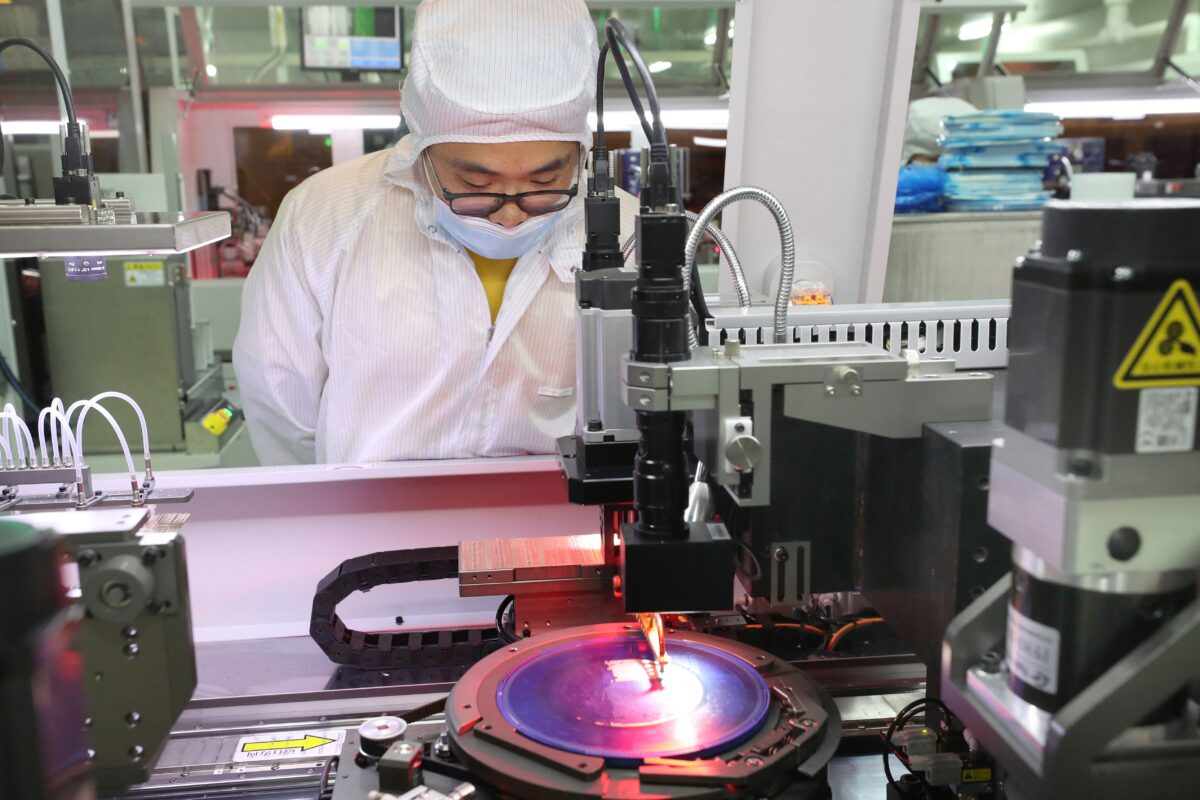
An employee makes chips at a factory of Jiejie Semiconductor Company in Nantong, in eastern China’s Jiangsu Province on March 17, 2021. (STR/AFP via Getty Images)
By and
The Chinese Communist Party (CCP) is exploiting weaknesses in the United States’ patent protection laws to gain the upper hand in technological innovation, according to an upcoming film, and big tech companies are helping it in the effort.
“In the innovation race with China, there is no prize for second place,” said Luke Livingston, director of the film “Innovation Race,” during an interview with EpochTV’s “China Insider” at the Western Conservative Summit in Denver, Colorado, on June 4.
“China’s moved into number two by stealing our innovation. But they’re not satisfied with staying there and being a leading manufacturer. They want to move from manufacturing to innovation.”
Livingston’s film, Innovation Race, premiered at the Western Conservative Summit last week and explores the threat posed to the world by a globally ascendant CCP. A key focus of the film is how the CCP is exploiting weaknesses in the United States’ patent protection system and how those weaknesses might be shored up in order to restore the United States to dominance in global technological innovation.
“People think, well, China just steals technology, that’s all they do,” Livingston said. “But the American public needs to understand that China, the CCP, are not only stealing intellectual property, they’re also wanting to move from that to innovation. They want to become innovators. They want to own the technology that they’re manufacturing.”
To that end, Livingston said that CCP leadership was studying 250 years of American history, seeking to understand and exploit America’s successes without replicating its failures. Foremost among those failures, he said, was the United States’ continual weakening of its patent protection laws to coddle big tech companies from competition.
“We have been shooting ourselves in the foot the last 10 years by weakening our patent system to allow big tech to pull the ladder up on little guys that are trying to disrupt the markets,” Livingston said.
Indeed, major tech companies like Google have consistently lobbied the U.S. government to water down patent laws that allow inventors with new, better ideas, to effectively compete with them, thus ensuring big tech companies a greater market share by effectively prohibiting small businesses from being able to make a living by creating revolutionary new technologies.
Moreover, Livingston said, these corporations regularly harass up-and-comers with frivolous lawsuits in order to wear out potential competitors who do not have the legal knowledge or resources to counter a flood of bad-faith attacks against their business, and often simply close up shop without putting up a sustained fight.
China, meanwhile, was moving to occupy the void in patent law left by big tech in order to further reshape global laws in its own favor. By exploiting weaknesses in U.S. patent protections, Livingston said, China could usurp its status as the world leader in tech innovation by better securing rights to critical and emerging technologies than the United States.
“China wants to move,” Livingston said. “They know they can’t stay in second place.”
“So they’re moving towards designing, innovating, securing that global governance of intellectual property, things like that.”
To that end, Livingston said that Innovation Race was really about ensuring that the United States could continue to lead the world in developing new technologies, and thereby continue creating the tools to make everyone’s lives more comfortable and efficient. Moreover, he said, ensuring such dominance was vital to preserving the liberties that the CCP was so set on destroying.
“People need to realize that if we lose the innovation race with China,” Livingston said, “they will control the world’s technology, they’ll control the world’s economy, and they’ll control you.”